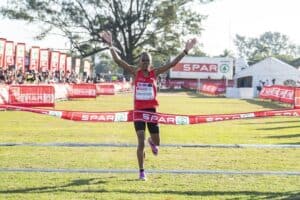Alan Robb's 1978 Comrades presents a strong argument for simplicity and not overthinking things.
Glued into one of my old scrapbooks are some faded dog-eared newspaper articles of the 1978 Comrades Marathon.
That year I ran my second Comrades Marathon and my first ‘down’ run. To be honest I kept these articles because my 14th place finish meant my name appeared in those newspapers that published the first 20 finishers. Fame at last!
One photograph in that scrapbook, however, always catches my eye. It’s a faded black and white photo of Alan Robb’s head poking out from above a shower door. Clearly, he is enjoying a shower in Durban’s famous Kingsmead stadium.
Alan’s running vest is also captured in the photo. It dangles from a towel rack with Alan’s Comrades number, 1704 still pinned to it.
But it’s the caption on the photograph that grabs one’s attention: “Race winner Alan Robb enjoys his shower and no one else has finished the race!”
Dominant performance
The 1978 Comrades was Alan’s greatest run, and indeed one of the greatest Comrades runs ever witnessed. He simply made the 1978 Comrades his own.
His 5:29:14 finishing time made him the first runner to break the magical 5:30 barrier. That year second place finisher ‘Dancing’ Dave Wright was 20 minutes behind Alan. And in 14th place I was just discarded
flotsam and jetsam over 40 minutes adrift of Alan.
As we look back nearly half a century later it is the sheer uncomplicated simplicity of Alan’s win that stands out. In this modern era where our sport is often overcomplicated, and every detail requires analysis, it is fascinating to learn how Alan’s approach was to “just get on with it, train hard and race hard.”
ALSO READ: Fordyce’s Comrades tales: In running, like cooking, you need the right mix
In early January 1978 Alan Robb started training in earnest. Wearing old Tiger Boston shoes with a thin rubber sole he trained helluva hard until the end of May, raced a couple of long races including the Two Oceans and Korkie ultras and declared himself ready a few days before race day.
Alan flew down to Durban on the afternoon before the race (his return airfare to Durban was a hefty R45). He stayed with friends who also seconded him the following day.
He then walked across the road to the restaurant at which he always dined and ordered his usual
cheeseburger and chips and two Castle lagers.
On race morning he drank a cup of coffee, pulled on his now worn and battered Tiger Bostons and his Germiston Callies running gear and lined up at the start.
His tactics were simple; he ran “helluva hard” until he reached Kingsmead stadium.
On the way he drank flat coke and water. After the race he had a few more beers.
Minimalist approach
It is interesting to contrast Alan Robb’s simplistic, minimalist approach to his racing in the 1970s (he won four Comrades marathons and earned 12 top-10 gold medals) with the modern highly complicated science racing has become.
Every serious runner now has a specialist coach who advises and recommends training schedules. Alan was self-coached.
Modern runners also rely on a variety of gadgets. They own smart devices and watches, and they race with pacing charts and heart monitors to gauge their pace.
“I didn’t need a device to tell me I was stuffed while climbing a hill, Bruce,” Alan once told me. “Or a smart watch. I used an old wristwatch and put the big hand on the 12 and the little hand on the six when the gun fired to start the race.”
ALSO READ: Shorter distance races need to close the gap on Comrades prize purse
In stark contrast to Alan’s flat coke and water, runners now use special gels and energy bars, recovery shakes and protein mixtures to fuel their journeys.
The old Tiger Bostons have been replaced by state-of-the-art shoes with air, gels and carbon fibre plates.
All deeply admirable and exciting scientific advances but it’s interesting to note that last year’s race was won in a time a little under a minute slower than Alan’s 1978 triumph.
Of course, modern progress and advanced technologies are to be welcomed and we all make grateful use of them. I wish we had these wonderful aids back in the 1970s and 80s. I would have especially valued a coach.
It certainly makes one wonder what time Alan might have run had he enjoyed the benefits of our modern support systems, but his 1978 Comrades presents a strong argument for simplicity, not overthinking things and just getting on with it.
Support Local Journalism
Add The Citizen as a Preferred Source on Google and follow us on Google News to see more of our trusted reporting in Google News and Top Stories.






